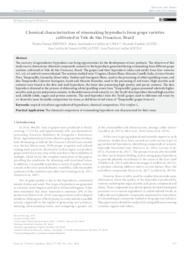Chemical characterization of winemaking byproducts from grape varieties cultivated in Vale do São Francisco, Brazil.
Chemical characterization of winemaking byproducts from grape varieties cultivated in Vale do São Francisco, Brazil.
Autoria: RIBEIRO, T. P.; LIMA, M. A. C. de; ALVES, R. E.; GONÇALVES, A. L. de S.; SOUZA, A. P. C.
Resumo: The recovery of agroindustry byproducts can bring opportunities for the development of new products. The objective of this study was to characterize chemical compounds contents in the byproducts generated during winemaking from different grape varieties cultivated in Vale do São Francisco, Brazil. The grapes and their byproducts (skins and seeds) from four wineries (w1, w2, w3 and w4) were evaluated. The varieties studied were: Viognier, Chenin Blanc, Moscato Canelli, Italia, Arinto+Fernão Pires, Tempranillo, Grenache, Mourvèdre, Verdejo and Sauvignon Blanc, used in the processing of white/sparkling wines, and also Tempranillo, Cabernet Sauvignon, Syrah and Alicante Bouschet, used in the processing of red wines. High ascorbic acid contents were found in the skin and seed byproducts, the latter also presenting high protein and pectin contents. The skin byproduct obtained in the process of elaborating white/sparkling wines from ?Tempranillo? grapes presented relatively higher ascorbic acid, pectin and protein contents. In the elaboration of red wines by w1, the ?Syrah? skin byproduct showed high ascorbic acid, soluble solids, sugars and protein contents. The seed byproduct from the ?Syrah? grapes used to elaborate red wines by w1 showed a more favorable composition for reuse, as did those of red wines of ?Tempranillo? grapes from w3.
Ano de publicação: 2018
Tipo de publicação: Artigo de periódico
Unidade: Embrapa Semiárido
Palavras-chave: Agroindustria, Byproducts, Chemical composition, Composição Química, Compostos químicos, Subprodutos, Uva, Vinificação, Viticultura, Vitis
Observações
1 - Por padrão são exibidas publicações dos últimos 20 anos. Para encontrar publicações mais antigas, configure o filtro ano de publicação, colocando o ano a partir do qual você deseja encontrar publicações. O filtro está na coluna da esquerda na busca acima.
2 - Para ler algumas publicações da Embrapa (apenas as que estão em formato ePub), é necessário ter, no celular ou computador, um desses softwares gratuitos. Sistemas Android: Google Play Livros; IOS: iBooks; Windows e Linux: software Calibre.
Acesse outras publicações
Acesse a Base de Dados da Pesquisa Agropecuária (BDPA) para consultar o acervo completo das bibliotecas da Embrapa.

